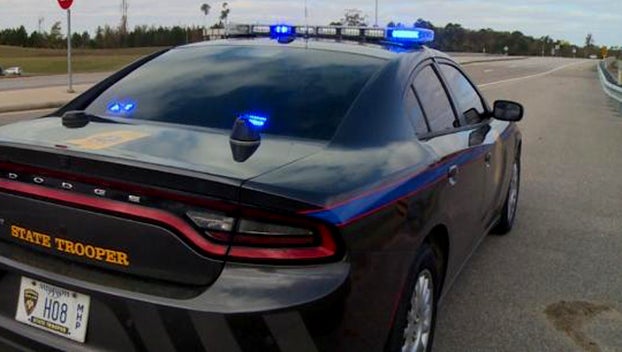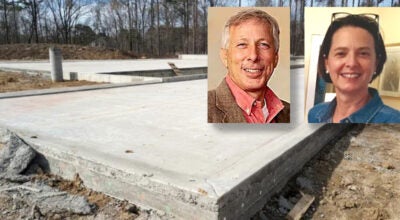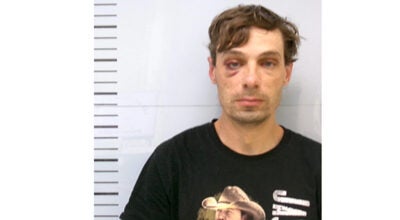Traffic stop ends with Mississippi trooper getting tickets after giving grieving man hug
Published 10:27 am Sunday, July 25, 2021
Months after their first chance encounter, Michael Williams still speaks with amazement of the time he crossed paths with a Mississippi state trooper.
The New Orleans native has told friends and family the story many times of how the officer’s act of kindness was an unexpected lift after the death of Williams’ younger brother in a triple shooting in Algiers on March 28.
An evening or two after the 18-year-old died, Williams was sitting on his porch, trying his best to communicate with his brother in heaven.
“We’re a real spiritual family,” he said. “It felt like he could hear me during the time I was talking with him.”
He asked for a sign.
“I wanted him to show me some type of way, just let me know he’s all right.”
Williams woke the next morning restless, unable to sit around the house battling grief.
“It was weighing too heavy,” he said. “I was looking at his picture on the wall, and I couldn’t stop. I had to get out of the house.”
He decided to take a trip to Mississippi to place a few sports bets at a casino before returning home.
The whole time he was behind the wheel, thoughts drifted back to his brother.
“I was just in a daze,” Williams said. “I had all kinds of thoughts running through my mind — retaliation thoughts. They took my brother from me … all kinds of thoughts … even if I didn’t want to be here anymore. Why did this happen?”
Williams had recently taken on a more prominent role in helping guide his younger brother during a difficult time to be a teenager in New Orleans with the recent crime surge.
“He was going through teenage things I went through as a kid,” Williams said.
“When I was a teenager, I did the worst things. My family disowned me when I was 16.
“When they called me about my little brother’s problems, I looked at it as my time to right those wrongs. I took that to heart weeks before he died.”
A POTENTIAL SPEEDING TICKET TURNS INTO A WARM EMBRACE
On his way back from the casino, Williams noticed a state trooper parked along a Hancock County highway.
“I see his vehicle from a mile away,” Williams said. “I’m passing him knowing he’s right there, and I’m thinking I’m doing the speed limit. When I pass, he’s still sitting there. When I got a mile down the road, I still see the cop sitting there.
“Before I know it, he’s right there behind me with his lights on.”
Williams pulled his Chevrolet Camaro over, and Trooper Caleb McQueen walked up to the driver’s side door. The trooper informed him the radar gun showed he was speeding, and Williams quickly apologized.
“He asked me for my license and registration, and I gave it to him,” Williams said. “I was looking for him to do the normal protocol and walk back to his vehicle. I leaned back on my seat. I was wore out.”
Instead of returning to his patrol vehicle, McQueen turned his attention to Williams.
“He looked at me and said, ‘What’s wrong? Tell me what’s wrong,’” Williams said. “This took me aback because he’s a cop, a white cop at that. I don’t have problems with white people, but I’m looking at a big, white cop. I’m a Black guy with dreadlocks. I’ve been on the other side of the law.
“I said, ‘Yeah, man. Someone just killed my brother.’”
McQueen said Williams had looked sad, like something was bothering him. With as many people as the trooper interacts with, “you get a feeling when something is weighing on their mind,” he said.
Why did the trooper ask what was wrong?
“Just his appearance. He looked sad, down and something was bothering him,” McQueen said. “You talk with a lot of people and interact with a lot of people, and you get a feeling when something is weighing on their mind.
“Something felt right about asking him, ‘Hey, what’s on your mind?’ It felt like the right thing to do. He just started telling me everything.”
Williams relayed the story of his brother, how he had recently taken on a greater responsibility in helping him.
“I wanted him out of the city of New Orleans with all the crime going on,” Williams said he told McQueen at the time. “Most of the crime in New Orleans is committed in an age group between 12 and 17.”
“I wanted him to get out of the city. Two weeks before he died, I had him staying with me.”
A SIGN
McQueen said the two talked for about 12-15 minutes. He expressed his condolences, and handed Williams back his license and registration without issuing a ticket for speeding.
As the two began to part ways, Williams asked Caleb McQueen for his name.
“He bent down in my car and moved whatever was in the way of his badge,” Williams said. “Once I see his name, I started crying nonstop.
“He’s looking at me, ‘What’s wrong?’ I point at his badge, and I’m crying and I can’t get the words out. It was two in the afternoon, a beautiful day, and I’m literally crying nonstop. I don’t ever cry.”
At that point, Williams pulled out his smartphone and pulled up a news report on the death of his brother — Caleb Johnson.
“He was bending down in my car looking at the story, saying, ‘Oh my God, wow,’” Williams said. “I couldn’t get, ‘That’s his name’ out.
“He got chills, and I got chills. I couldn’t stop crying. Wow, this is bigger than us.”
What happened next would have caught the eye of anyone driving by.
“He stepped out of the car, and we met at the back of his car,” McQueen said. “Me and him ended up hugging it out, talking a little bit more before he left.
“At that point, it was obvious that it was very much meant to be.”
Williams remembers the moment in vivid detail.
“It was 2 in the afternoon with cop cars passing,” he said. “They had to wonder what the hell was going on over there. We hugged for a good 5 minutes. I’m a small guy, 5’8”, 150-155 pounds. He’s a big football-player looking cop. I felt his bulletproof vest, and I couldn’t let him go.
“I knew for a fact that was my brother. It had to do something with my brother. What are the chances?”
Both men left the side of the highway stunned.
McQueen called dispatch to share the story of what happened while Williams continued home, relaying the details to his wife and family.
A SECOND ENCOUNTER IN MISSISSIPPI
Still touched by the moment in the days that followed, Williams began to think of different ways to show his appreciation.
“I thought maybe I could get him a couple of Mississippi State T-shirts or Ole Miss,” Williams said. “Maybe I could call his boss and tell him to give him employee of the month. I didn’t know what to do.
“I go home and tell everybody the story, and I get chills when I tell it. A week passes, and I still haven’t done anything about it. I wanted it to be something that’s meaningful and nice.”
Two weeks later, Williams was again on his way through Hancock County, this time with family in the car.
Again, he saw a law enforcement vehicle parked on the side of the road.
“Before I passed him, I told (my wife) that I’m going the speed limit as I pass,” Williams said. “He gets behind me and stops me. I thought, ‘Oh man, here we go again.’ Lo and behind, I look up and it’s my boy.”
“I put the car in park, and got out. (McQueen) didn’t know who he was stopping.”
At this point, both men are joking with each other as if they’re old friends.
“I’m for real, I didn’t know I was speeding,” Williams told McQueen. “I’ve got to cut my foot off. It must be too heavy.
“He told me that I better calibrate that thing. He smiled and laughed.”
Williams didn’t realize that, well before he spotted the Mississippi Highway Patrol vehicle, McQueen’s radar gun had showed him driving 82 mph in a 65 mph speed limit zone.
But again, no speeding ticket was issued.
“Both times he showed me through his soul that he cared,” Williams said. “I took that and I drove off. I’m driving home, and me and my wife are wildin’ about it together. I’ve got to do something for him.”
While the two men were chatting, Williams mentioned he was thinking about getting him some Mississippi State and Ole Miss gear. McQueen responded that he was more of a Florida State fan.
Williams then considered buying FSU gear, but decided to do more.
“I feel like that’s not enough for what he did for me and the connection we had,” he said.
Williams eventually settled on a pair of season tickets for Seminole football.
“I’m not rich by any means,” Williams said. “I’m unemployed, but I’ve saved money. I’ve been unemployed since COVID, but I’ve got a dog kennel started. I just started my business. I’m not rich or anything, but I didn’t care how much it cost. That would make his day.
“He made my day twice. He made my life, because that’s something I’ll never forget.”
Williams then called the Mississippi Highway Patrol to inform McQueen’s co-workers what he wanted to do.
“I told them the whole story, and they were crying. The second woman had tears in her eyes,” Williams said. “I don’t want him to know what’s coming. I wanted to surprise him with the things I got for him. They wanted his colleagues to be around so they know what he did for somebody.”
When Williams surprised McQueen, many of the trooper’s co-workers and superiors were there to watch.
McQueen’s first response to the gift of season tickets was disbelief, “Wow, man. No, no, no, no you didn’t.”
Again, the two men hugged it out.
“I told him, ‘I want to see you on ESPN. I know what seats you have.’ I got him some good seats,” Williams said.
The tickets were the least he felt he could do.
“He gave me one last chance to experience something I love the most, my little brother,” he said. “I’ve been telling everybody the story and what he did, what he meant to me that day.
“That day could have went suicidal, homicidal … I felt like my brother heard me and sent an officer to intervene. It was divine intervention.”
More News






